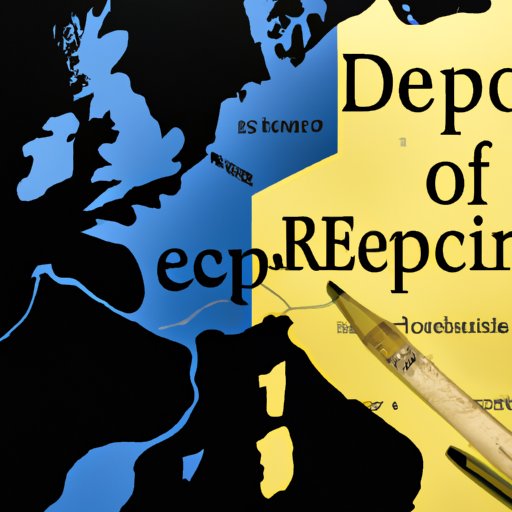Introduction
The Great Depression was a severe worldwide economic depression that lasted from 1929 to 1939. It was the longest and most severe economic downturn in modern history, resulting in widespread poverty and unemployment. The Great Depression had a major impact on international relations and ultimately led to the outbreak of World War II in 1939. In this article, we will explore the economic, political, and social factors that contributed to the conflict and analyze the role of U.S. neutrality laws in the onset of the war.
Analyzing the Economic Impact of the Great Depression on International Relations
The Great Depression had a devastating effect on global trade. Many countries were forced to impose tariffs and other restrictions on imports and exports in order to protect their domestic industries. This caused a sharp decline in international trade, which further exacerbated the economic crisis. Currency devaluation was another factor that contributed to the conflict. Countries such as Germany and Japan began to devalue their currencies in order to stimulate their own economies, but this created tension between them and other nations. Bankruptcies and unemployment also played a role in the onset of World War II. As businesses went bankrupt and people lost their jobs, governments were forced to increase military spending in order to maintain national security.

Examining the Political Consequences of the Great Depression in Europe
The political consequences of the Great Depression were particularly pronounced in Europe. The economic crisis created an environment conducive to the rise of fascism, as many people turned to authoritarian leaders who promised stability and prosperity. In Germany, Adolf Hitler’s Nazi Party rose to power in 1933, leading to the outbreak of World War II in 1939. The reparations payments imposed on Germany after World War I also played a role in the conflict. Germany was forced to pay huge sums of money to the Allies, which caused widespread resentment and hostility towards other countries. The Great Depression also led to a global arms race as countries sought to build up their militaries in order to gain an advantage over their rivals.

Examining the Impacts of U.S. Neutrality Laws on World War II
The United States’ policy of neutrality during the lead-up to World War II had a major impact on the conflict. The U.S. refused to intervene in European affairs, despite the rising tensions between countries. This allowed Hitler to consolidate his power in Germany and launch his campaign of aggression without any interference. U.S. neutrality laws also prevented the country from supplying weapons and other materials to its allies in Europe, which hindered their ability to defend themselves against the Axis powers. Ultimately, U.S. neutrality laws had a significant effect on the course of World War II.
Conclusion
The Great Depression had a profound impact on international relations and ultimately led to the outbreak of World War II in 1939. The economic crisis caused by the Great Depression resulted in widespread poverty and unemployment, which fueled the rise of fascism in Europe and enabled Hitler to consolidate his power in Germany. Currency devaluation and increased military spending also played a role in the conflict. U.S. neutrality laws prevented the country from intervening in European affairs, which allowed Hitler to launch his campaign of aggression without interference. Ultimately, the Great Depression had far-reaching global implications and left a lasting legacy on world history.
(Note: Is this article not meeting your expectations? Do you have knowledge or insights to share? Unlock new opportunities and expand your reach by joining our authors team. Click Registration to join us and share your expertise with our readers.)
